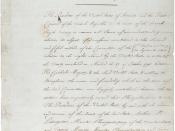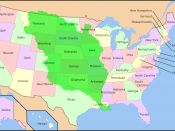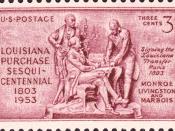Every school child learns at an early age of the Louisiana Purchase. They learn simply of Thomas JeffersonÃÂs great real estate deal that more than doubled the size of the young United States. What they do not learn, however, is of the intense debate in congress, which nearly put the brakes on JeffersonÃÂs plan; or of the underhanded financial deals the Jefferson made while congress bickered in order to come up with the funding for the purchase; or of the decisions Jefferson made that seemingly compromised some of his strongest beliefs. It is these details that tell the real story of the Louisiana Purchase.
The events that led up to the Louisiana Purchase are themselves grounded in controversy. Late in the 1790s, Spain secretly ceded the Louisiana territory to the French, but seemingly continued to be governed by the Spanish crown. Late in 1802, the Spanish violated PinckneyÃÂs Treaty by denying American shippers the right to deposit goods in New Orleans.
Soon, after we learned of the cession to the French. On January 4, 1803, congress debated over the legitimacy of the claims, asking for the documents that show it. On February 14, 1803, congress debated whether or not it was in JeffersonÃÂs power to send an expedition to France to discuss our rights on the Mississippi, and whether or not he should use military force to enforce those rights. On February 25, congress authorized the President to organize 80,000 militia to protect American interests on the Mississippi. Congress was ready to go to war, if need be, but the President was not.
The Louisiana Purchase was signed on April 20, 1803, but it took congress nearly 6 months to approve it. That whole time, they continued to debate whether the President had the right to make...



Good information poor style
The information contained within this essay is good, and the outline is also good. But the writer uses very colloquial language. One example of this is: "He basically snuck money out of other federal funds to pay the French" or "Jefferson had to come up the money" There are many more like that, very low-brow language.
0 out of 0 people found this comment useful.